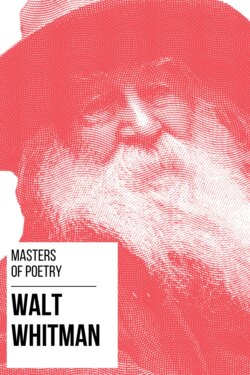Читать книгу Masters of Poetry - Walt Whitman - August Nemo, John Dos Passos, Ellen Glasgow - Страница 38
На сайте Литреса книга снята с продажи.
III
ОглавлениеWhitman rarely celebrates exceptional characters. He loves the common humanity, and finds his ideals among the masses. It is not difficult to reconcile his attraction toward the average man, towards workingmen and "powerful, uneducated persons," with the ideal of a high excellence, because he finally rests only upon the most elevated and heroic personal qualities,—elevated but well grounded in the common and universal.
The types upon which he dwells the most fondly are of the common people.
"I knew a man,
He was a common farmer—he was the father of five sons,
And in them were the fathers of sons—and in them were the fathers of sons.
"This man was of wonderful vigor, calmness, beauty of person,
The shape of his head, the richness and breadth of his manners, the pale yellow and white of his hair and beard,
and the immeasurable meaning of his black eyes,
These I used to go and visit him to see—he was wise also,
He was six feet tall, he was over eighty years old—his sons were massive, clean, bearded, tan-faced, handsome,
They and his daughters loved him—all who saw him loved him,
They did not love him by allowance—they loved him with personal love;
He drank water only—the blood showed like scarlet through the clear-brown skin of his face,
He was a frequent gunner and fisher—he sailed his boat himself—he had a fine one presented to him by a
ship-joiner—he had fowling-pieces presented to him by men that loved him;
When he went with his five sons and many grandsons to hunt or fish, you would pick him out as the most
beautiful and vigorous of the gang,
You would wish long and long to be with him—you would wish to sit by him in the boat, that you and he might
touch each other."
All the motifs of his work are the near, the vital, the universal; nothing curious, or subtle, or far-fetched. His working ideas are democracy, equality, personality, nativity, health, sexuality, comradeship, self-esteem, the purity of the body, the equality of the sexes, etc. Out of them his work radiates. They are the eyes with which it sees, the ears with which it hears, the feet upon which it goes. The poems are less like a statement, an argument, an elucidation, and more like a look, a gesture, a tone of voice.
"The word I myself put primarily for the description of them as they stand at last," says the author, "is the word Suggestiveness."
"Leaves of Grass" requires a large perspective; you must not get your face too near the book. You must bring to it a magnanimity of spirit,—a charity and faith equal to its own. Looked at too closely, it often seems incoherent and meaningless; draw off a little and let the figure come out. The book is from first to last a most determined attempt, on the part of a large, reflective, loving, magnetic, rather primitive, thoroughly imaginative personality, to descend upon the materialism of the nineteenth century, and especially upon a new democratic nation now in full career upon this continent, with such poetic fervor and enthusiasm as to lift and fill it with the deepest meanings of the spirit and disclose the order of universal nature. The poet has taken shelter behind no precedent, or criticism, or partiality whatever, but has squarely and lovingly faced the oceanic amplitude and movement of the life of his times and land, and fused them in his fervid humanity, and imbued them with deepest poetic meanings. One of the most striking features of the book is the adequacy and composure, even joyousness and elation, of the poet in the presence of the huge materialism and prosaic conditions of our democratic era. He spreads himself over it all, he accepts and absorbs it all, he rejects no part; and his quality, his individuality, shines through it all, as the sun through vapors. The least line, or fragment of a line, is redolent of Walt Whitman. It is never so much the theme treated as it is the man exploited and illustrated. Walt Whitman does not write poems, strictly speaking,—does not take a bit of nature or life or character and chisel and carve it into a beautiful image or object, or polish and elaborate a thought, embodying it in pleasing tropes and pictures. His purpose is rather to show a towering, loving, composite personality moving amid all sorts of materials, taking them up but for a moment, disclosing new meanings and suggestions in them, passing on, bestowing himself upon whoever or whatever will accept him, tossing hints and clues right and left, provoking and stimulating the thought and imagination of his reader, but finishing nothing for him, leaving much to be desired, much to be completed by him in his turn.
